

 |
 |
||||
| Home | Reviews | Extras | Forums |
|
Sunday Without GodSynopsisOn the seventh day, God left humanity behind in a world where nobody could die. This created the need of gravediggers, who are the only beings who could really put a human being to permanent rest. In a quiet countryside village lives Ai Astin. Her mother just passed away, leaving her with the task of being a gravedigger. But this task is quickly curtailed when a mysterious man named Hamprey Hambart wanders in and kills everyone. ReviewJust so we're clear on this; Sunday Without God might have its vaguely Christian references at the very beginning as kind of an... explanation (or a blame game, depending on how you look at it), but the show itself isn't particularly religious about anything at all. It's certainly a miraculous world in many ways, particularly in the way it handles death, but that's about the extent of it. 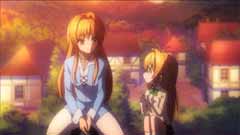  It's also yet another example of why first impressions can't be trusted. Sunday Without God's first episode is just terrible. Not in the sense that it doesn't fit in with the rest of the show, but more in the way that it steamrolls the viewers with "I'm so mysteeeerioooooous". It's a frustrating experience just to watch, because the actions of some of the characters -- Ai in particular -- just doesn't make a whole lot of sense, especially at first. The concept of death becomes clear quickly enough, when Hamprey (it's an alias -- don't think too hard about it) arrives and literally shoots everyone in the head. So when the people he shoots fail to die, Ai is understandably a bit upset about all of this. This eventually becomes the framework of which most of the show's issues are centered around, but it's also not the full extent of it. In many ways, the show is more of a "be careful what you wish for" deal, because that seems to be the driving force of this world. Ai's world is one that was wished for, as is Hamprey's eventual reveal. The show then goes into a routine where story arcs are settled within the scope of two or three episodes, all of which present another aspect of the world and its supernatural properties. The one downside to this is that the show is good at explaining how it works, but you never really learn how it got to be this way. Only that it happened around 14 years ago, hence Ai being twelve is actually a big deal, because childbirths were also supposed to have ceased. That's why the opening kind of hurts, because it introduces us to our main lead, Ai; then proceeds to tell us why her existance doesn't make any sense, and then expects us to accept that she would want to travel with the guy who just murdered her whole life and makes a habit of pointing a gun at her head after that. Sure, she's obviously upset about it, and does so partially out of some kind of odd sympathetic revenge, but you'd think a young child would be a bit more scarred after witnessing something like that. What I did not expect, though, is that this story arc quickly came to a very silly conclusion where it introduces a few more main players before sending our main lead on her merry way. If I were to choose a favorite story arc, then the second one taking place in episode four to six would be mine. It's a story that takes place in a city created for the technically dead (the term'll make sense if you watch the show), which adds a little more framework about the urgency of putting the dead to rest; we learn that if they're not, their selfishness grows to the point where they basically become zombies, slaves to their hunger. However, this can be avoided if the recently deceased attend therapy... apparently. It sounds silly, I know, but it works within the framework of the show. 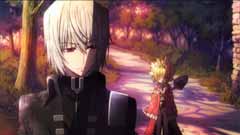 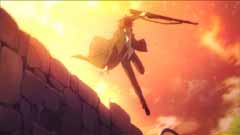  What I really like about this part -- and, well... most parts of the show -- is that it doesn't judge, and it's open enough for interpretation that you don't have to find one "right" answer, because neither does the residents of the town, or the people surrounding it. A viewpoint is rarely forced on the audience, something I wish more shows would do. That's partially why I had some problems swallowing the first couple of episodes, because that's what I was lead to believe at first, and I found that a pretentious approach to things. While I did appreciate the hands-on approach to storytelling, it also meant that I had to just take a lot of things at face value. We know that people don't really "die" in this show unless a gravedigger put them to rest (which does occasionally happen involuntarily, hence the reason why the town of the dead was created), but we're never really told why this happen or what makes this interesting phenomena work. Later, we meet still-living people with peculiar powers, which are also never explained. The audience has little choice other than just accept that things are the way they are because. However, even though I'm the sort of guy who prefers things like phenomenas or miracles explained, at least to some degree, Sunday Without God is simply a very good show. Maybe that's because, despite what I just said in the last paragraph, the show works more like a typical episode-to-episode show, and the aforementioned multi-episode story arcs come to a conclusion before the show moves on to the next, and most of the character motivations and story arcs are at least brought to a finalizing conclusion. Ai is on a self-proclaimed journey to save the world, and in a sense, that's pretty much what she does, one group of people at a time. 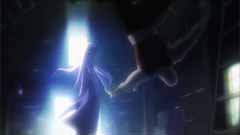 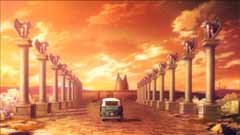 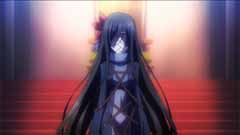 This show was hardly the best show I had watched during that particular season lineup -- The Eccentric Family deserves that honor -- but Sunday Without God ended up being a surprisingly compelling and watchable show by itself. Its ending is a little abrupt -- a sure sign of it being based on until-now unfinished light novel material -- but that's part and parcel of its episodic setup. Striking a nice balance of mystery and revelations, Sunday Without God holds a steady course into watchability. — Stig Høgset Recommended Audience: The show is surprisingly violent; people are shot and sometimes also shown in a dismembered state just to make sure we get the severity of the whole "not dying" thing. It's not trying to be particularly excessive, but its violence alone limits the show to people almost done with their teenage years and upwards. Version(s) Viewed: Digital stream from Crunchyroll, Japanese with English subtitles. Review Status: Full (12/12) Sunday Without God © 2013 Madhouse, Kaminai Production Committee. |
 |
|
| © 1996-2015 THEM Anime Reviews. All rights reserved. |